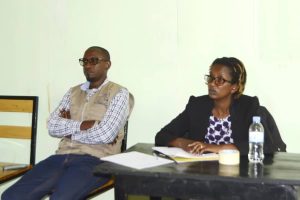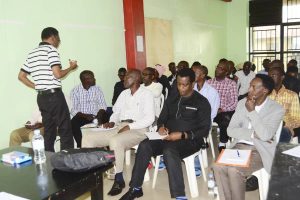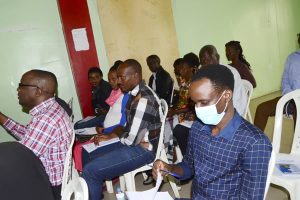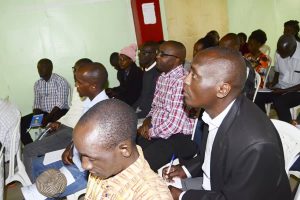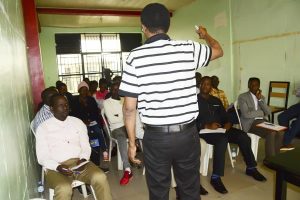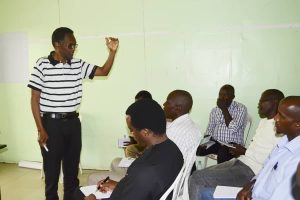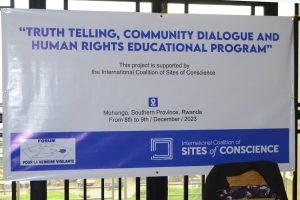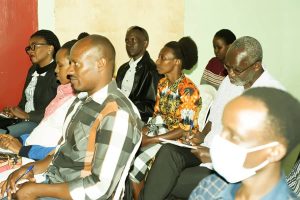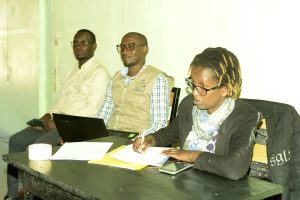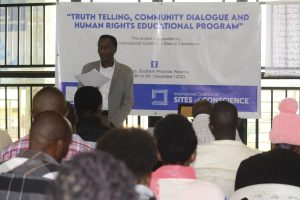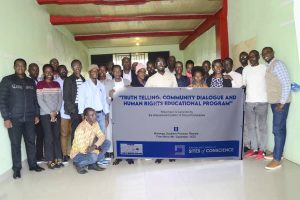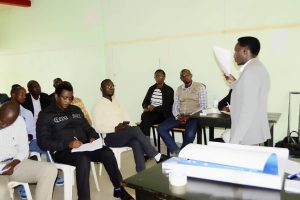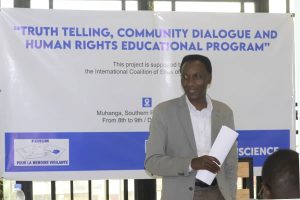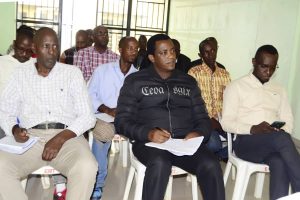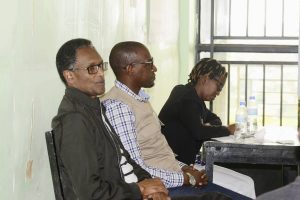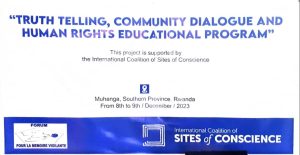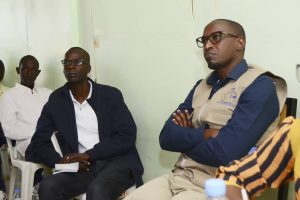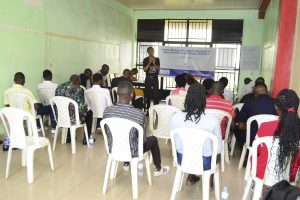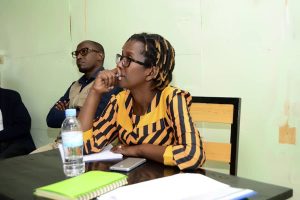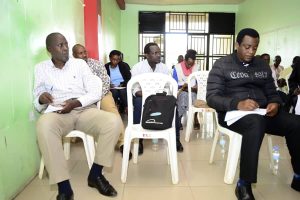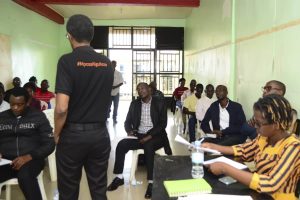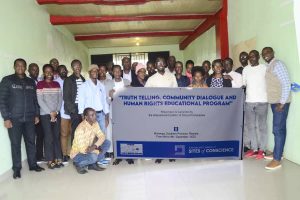 The bell of the “Truth Telling, Community Dialogue and Human Rights Educational Program” continues to ring in various districts of Rwanda. After the Mahama refugee camp in the east of the country, and Huye in the south, the “Forum pour la mémoire vigilante, FMV”, organized a third exchange workshop for Burundian refugees living in Muhanga, one of the districts in Rwanda’s southern province. Muhanga has hosted a Burundian refugee community of around 50 families since 2015. The session was held on December 8 and 9. It brought together more than twenty Burundian refugees.
The bell of the “Truth Telling, Community Dialogue and Human Rights Educational Program” continues to ring in various districts of Rwanda. After the Mahama refugee camp in the east of the country, and Huye in the south, the “Forum pour la mémoire vigilante, FMV”, organized a third exchange workshop for Burundian refugees living in Muhanga, one of the districts in Rwanda’s southern province. Muhanga has hosted a Burundian refugee community of around 50 families since 2015. The session was held on December 8 and 9. It brought together more than twenty Burundian refugees.
The “Truth Telling, Community Dialogue and Human Right Educational Program” project is in line with FMV’s core mission of preventive education against crime and social conflict.
The project is funded by “the International Coalition of Sites of Conscience”, a global US network of over 350 historic sites, museums, and memory initiatives that preserve the past to fight for truth and transitional justice today.
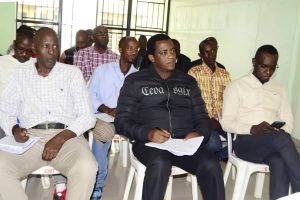 According to project leader Godefroid Sindayigaya, refugees must “face up to their history, talk about the repetitive crises that Burundi has experienced or is experiencing and of which they themselves are victims, while revealing the truth of the facts and the causes to avoid consequences”.
According to project leader Godefroid Sindayigaya, refugees must “face up to their history, talk about the repetitive crises that Burundi has experienced or is experiencing and of which they themselves are victims, while revealing the truth of the facts and the causes to avoid consequences”.
From the Mahama refugee camp to Muhanga, via Huye in southern Rwanda, the aim of the project’s workshops is to share the truth about the various wars that have taken place in Burundi, in order to reconcile points of view and give the victims a fresh start. In particular, those who are currently living in exile in Rwanda.
To enlighten and enrich the debates, Dr. Alphonse Rugambarara, a former Burundian politician who held high state office (minister, parliamentarian and even political prisoner) insisted on truth, national unity and reconciliation.
“Everyone is aware that up until now, the facts of the various crises that have shaken Burundi have often been either ignored, truncated or transformed, always to serve the interests of some and the demonization of others. This has plunged the country into a vicious circle of armed conflict and vengeance, resulting in the impoverishment of the Burundian population, the exile of part of the population, and a feeling of perpetual suspicion between different people due to their different socio-political affiliations, each one posing as a victim and seeing the other as a possible executioner”, he insisted.
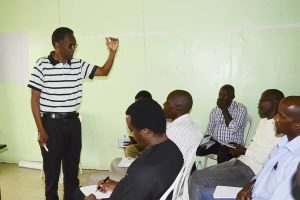 This human rights activist, one of the pioneers of Burundian civil society in the Ligue des Droits de l’Homme Iteka, does not mince words about respect for human rights, democracy, good management of the country, respect for institutions and good governance. “No one should suffer injustice or be prosecuted for what they are, what they have said, expressed or done, if the words or actions are not contrary to the terms of the country’s constitution”, he declares.
This human rights activist, one of the pioneers of Burundian civil society in the Ligue des Droits de l’Homme Iteka, does not mince words about respect for human rights, democracy, good management of the country, respect for institutions and good governance. “No one should suffer injustice or be prosecuted for what they are, what they have said, expressed or done, if the words or actions are not contrary to the terms of the country’s constitution”, he declares.
The second speaker, Dr. Denis Kazungu, clinical psychologist and psychopathologist, helped participants to understand and manage the potentially disastrous consequences of trauma.
More than just material possessions, victims lose loved ones.
“The events that shook the country have polarized Burundian society. This polarization leads everyone to see themselves as the only victims, the other group being, according to them, the executioners. Everyone acquires the profile of a potential killer, and no one seeks to understand the suffering of the other,” he explains.
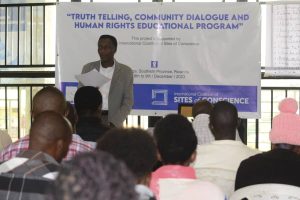 According to this psychologist, the victims’ loved ones shut themselves away in their suffering. “They don’t have the right to mourn, or a place to speak. State authorities only attempt superficial solutions in the form of statistics, which only deal with the form, without getting to the root of the problem. Even the rebellions that have arisen have not served as a wake-up call to the state manager,” he points out.
According to this psychologist, the victims’ loved ones shut themselves away in their suffering. “They don’t have the right to mourn, or a place to speak. State authorities only attempt superficial solutions in the form of statistics, which only deal with the form, without getting to the root of the problem. Even the rebellions that have arisen have not served as a wake-up call to the state manager,” he points out.
“This long-accumulated suffering, without recognition or consideration, without even the right to mourn or the right to express oneself, creates frustrations, revolts that lead to demands that can even engender acts of violence that force the other to react”, he concludes.
Commitments…
After explaining the facts, each participant laments the degree of trauma he or she has suffered. All those who initially believed themselves to be saints acknowledged that at least once, at some point in their history, they had suffered such traumas. The participants then discussed the possibility of healing from these traumas, and some salient points emerged.
“A duty of remembrance, enabling the victims’ loved ones to mourn and commemorate them, the lessons that everyone should learn from certain people who demonstrated humanism, people who, despite the circumstances of war, set themselves up as pillars of peace at the peril of their lives, making the right choices and breaking with this vicious circle, deciding to bequeath the right values to future generations. In short: effective resilience”, they unanimously agreed.
A number of recommendations were made…
“To organize other exchange workshops, create a psychological assistance center for victims of war trauma, organize such workshops for young teenagers in exile to eradicate the virus of division and prevent them from growing up in ignorance, organize another workshop and invite people who have experienced the same problems as those in Burundi, in this case Rwandans, to share their experience,” reads the final communiqué from the Muhanga workshop.
Coincidentally or not, the workshop was also held in conjunction with the celebration of International Human Rights Day in 2023.
For the FMV’s legal representative, it’s a great event for them and the International Coalition of Sites of Conscience, which supported the project.
“Truth is the primary evidentiary element of justice. Dialogue reveals needs and desires, and human rights education aims to transmit a universal culture of human rights by instilling the knowledge and values of UBUNTU for peacemaking or peacekeeping. With truth, dialogue and education on human rights, we have justice, we have security, we have everything we need in terms of the right to life, the right of the human being”, explains Mr. Ferdinand Ndayiragije.
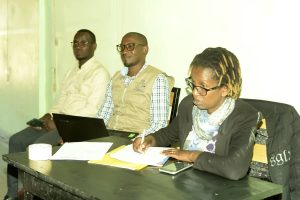 He adds: “The current project has enabled us to realize that we are products of our history, that as a result of cultural alienation, bloody events, genocide, war crimes, exclusion, division, etc., we have become sick, and are in the process of being treated.
He adds: “The current project has enabled us to realize that we are products of our history, that as a result of cultural alienation, bloody events, genocide, war crimes, exclusion, division, etc., we have become sick, and are in the process of being treated.
For him, “sharing experiences and telling the truth enable us to disprove and deconstruct the prejudices and false identities that colonization and the circumstances of our unfortunate history have instilled in us”.
The Muhanga workshop is the 3rd and penultimate session in the ongoing implementation of the “Truth Telling, Community Dialogue and Human Rights Educational Program” project. The next stop will be Kigali, the Rwandan capital, home to some ten thousand Burundian refugees.
FMV is a Rwandan organization founded on the values of Remembrance, Education and Prevention. FMV is a partner of the International Coalition of Sites of Conscience, an American NGO founded in 1999 and the only global network of Sites of Conscience present in over 65 countries, including Rwanda.
The two organizations share a common commitment to using the lessons of the past to find innovative solutions today to related social justice issues and the fight against genocide, crimes against humanity and atrocities of all kinds.
Some pictures of the event..
